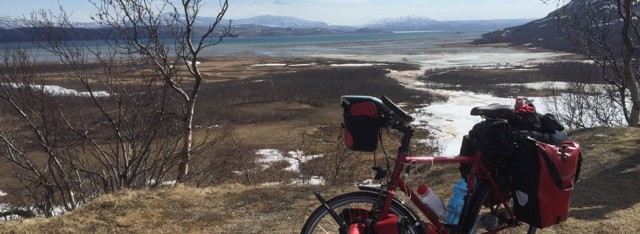I love it when it snows, and after several years of nothing significant the ‘Beast from the East’ brought buckets of the stuff over the past week. The only draw-back, from my point of view anyway, is that it makes cycling a little tricky; I don’t have any studded tyres.
-

-
More snow than Norfolk’s had in years
-

-
A winter wonderland
-

-
Salhouse Broad froze; although melting by the time I got this photo
Imagine if we could control the weather; but would that really be a good thing? The potential benefits around, for example, a predictable climate for agriculture, sunshine for the tourist industry, or rain for drought hit areas all sound good. But what about the impacts we couldn’t foresee or chose to ignore?
Controlling the weather in one region could adversely impact another geographical area, where perhaps they didn’t have as much money or influence. This downstream area could get hit by extreme weather, or mass species die-off events could become more common-place, such as the Saiga antelope catastrophe in Kazakhstan. In excess of 200,000 of this endangered species died in 2015, when human-caused climate change increased temperatures to such an extent it’s thought they triggered a bacteria present benignly in the antelopes at lower temperatures to cause hemorrhagic septicemia (blood poisoning and internal bleeding), with thousands dying within a few days of each other.
An increase in life-threatening diseases due to climate change could happen to human population centres, and some would argue it already is. For example Nigeria is currently experiencing an outbreak of Lassa fever, which in extreme cases has symptoms similar to Ebola, and has no vaccine. There are some theories that the increased frequency of this disease could be down to changing weather patterns.
So no, I don’t think we can be trusted to control the weather responsibly. We’re already doing it indirectly via human-caused climate change due to fossil fuel burning. The recent snowy weather resulted from unseasonably warm air being drawn up to the arctic, the Jet Stream slowing down and disrupting the polar vortex, which forced cold air and blizzards down to the UK. Whilst we experienced temperatures well below freezing in Norfolk, it was above freezing in parts of the Arctic, melting yet more of the already at record lows sea ice. This is explained much more eloquently and in far more detail on this website – well written and easy to understand; definitely worth a read.
Where am I going with this? I’m pointing out we often don’t really understand, or are unable to predict, the consequences of our actions on the planet.
As I mentioned in a previous recent blog post I’ve been pondering where we’re going as a species, and why we keep pursuing unsustainable growth and consumption, whilst the world literally collapses around us. Climate change is becoming a very tangible symptom of our labours. Surely we should be petrified for the future of our children and grandchildren, if not the other species we share the world with. Yes, the planet will survive us, however will anything else on the Earth be left by the time we check out?
There are lots of examples of as yet un-checked unsustainable activity in the present day, which we seem to be in denial about. All these have either obvious, as well as I suspect as yet unpredicted consequences. Here are a few examples.
- Human population growth. The world’s population is growing at around 83 million or 1.1% a year, although this rate has slowed down since peaking in the 1960’s at about 2.1%, and is predicted to fall further to around 0.1% by 2100. The graph below shows how dramatic this growth has been in the last 200 years. The impact this puts on the environment, especially as more of the population start to live ‘western’ lifestyles, is unsustainable.

- Agricultural land use. As this article in the New Scientist from 10 years ago says; humans are living completely beyond their ecological means. We knew this a long time ago but still pump fields full of fertilisers and pesticides, which in the long-term degrades the land and makes it less productive, as well as poisons the underlying substrates and surrounding countryside, reducing biodiversity. That coupled with soil erosion means scientists are predicting we only have a limited number of harvests left, maybe 100, due to our unsustainable farming practices. The good news is this should be reversible, given the right techniques and less reliance on chemical fertilisers. The big agrochemical companies, such as Monsanto, don’t really want you to know this for obvious reasons. Check out this video from Dr Elaine Ingham if you want to find out more, a real eye-opener.
- Fishing. In many areas of the world we’re literally stripping the oceans bare of life to feed our appetite for seafood. Huge industrial trawlers and dredgers indiscriminately take everything, and even if by-catch is thrown back it’s probably not going to survive. Studies have shown that fish numbers have halved since the 70’s, with some species being hit particularly hard such as tuna and mackerel; a 75% decline in numbers. Continued unsustainable fishing practices driven by consumer demand, coupled with horrific plastic pollution and coral reef bleaching, paint a grim picture as far as recovery is concerned. If however large areas of our oceans are designated as marine conservation areas, such as the Arctic, perhaps they’ll stand a chance.
- Meat eating. There are hundreds of articles out there, such as this one, describing the impacts of raising livestock on the environment. As demand grows due to an increasing population and new markets, the impacts will grow. These include a large contribution to the greenhouse gases causing climate change, increased pollution due to run off, increased water use, and more land being needed to for livestock resulting in deforestation. The amount of land needed to feed a human on meat is about 20 times more than needed for a vegetarian diet. This is clearly unsustainable. The answer seems obvious, eat less meat and dairy products, with the associated health benefits as side-effects.
- Fossil fuel use. We continue to burn vast amount of fossil fuels such as oil, coal and gas, in order to generate energy, heat our homes, or power transportation. The CO2 emissions from fossil fuel burning continue to increase, despite the Paris Climate Change agreement being signed in 2015. Burning fossil fuels is the primary cause of climate change. We have perhaps 100 years left of these primary fossil fuels, which means we’ll have used up what the world has to offer over the course of about 300 years, reserves that took millions of years to create. This has to be one of the best examples of unsustainable human-based activity, however with continued research and development hopefully alternatives such as electric cars (go Tesla!), renewables, or fusion energy will increase or come online soon.

CO2 emissions from fossil fuel burning
Those were a few examples of unsustainable activity, which seem to make less and less sense to a growing number of people, especially the younger generation who don’t understand how we could, as a race, have been so ignorant, and how we continue to pursue these activities. I think they’ll be an accounting at some point, and the history books won’t look back kindly on what will come to be regarded as criminal practices. It can be summarised quite simply…
Infinite economic, industrial and agricultural growth is unsustainable and therefore impossible when based on finite resources, coupled with environmental constraints
…not sure one can argue with that. A basic example of this can be found from studying the growth of a bacterial colony in a petri dish. The colony starts off slow, then grows exponentially using up the finite resources available, then dies off once the agar jelly runs out. A simple example but with obvious parallels to humans and the Earth.
There’s a lot of hope out there in terms of alternative more sustainable options, however these are reliant on:
- Public take up of the alternatives, and a willingness on everyone to make sacrifices to ensure long-term sustainability
- Funding for the research and development of these initiatives
- The same initiatives not being blocked due to profit seeking by the incumbent industries, who wield so much power and influence
- Politicians actually listening to their constituents and scientists
I’ve been reading recently about shifting baseline syndrome. Over time knowledge is lost concerning the state of the natural world, as people don’t perceive the changes taking place. Today’s younger generation won’t for example remember that gardens used to be full of butterflies, or that birdsong used to be so much louder, or that rhinos were once commonplace in Africa. It has to be a concern that the environment and biodiversity will continue to decline due to unsustainable activity, but people won’t realise the extent of the decline because they have no first hand experience of what things used to be like.
Over the last 25 – 30 years: (Source: WWF-UK Living Planet Report)
- 80% of freshwater species have declined
- Over 50% of populations of land species have declined
- 40% of our forests have disappeared to agricultural land with 15 million trees lost each year just for soy production
- 1 in 6 of the planet’s species are at risk of extinction from climate change
I hope that education will fill this gap, and Deep Ecology will start to become part of the syllabus; humans are just one of many equal components that make up the global ecosystem. We’re not above or apart from it, we’re a part of it, and could not only survive but thrive if things are done the right way.
I don’t know how we change public opinion quickly enough to make the changes needed to ensure we can survive and thrive. Most governments don’t seem to give it a high priority, or are swayed by lobbyists driving their own commercial agendas, and whilst industry is changing it’s debatable whether it will happen quickly enough. It’s bizarre that we can continue so blithely down this path when you can for example see the ice melting, species dying, diseases increasing, the plastic in our oceans, antibiotic resistance rocketing, and extreme weather events due to climate change happening. I can only assume most people are in a massive state of denial, and refuse to wake-up, because to do so would cause a mental breakdown.
The underlying causes of all this have to be the drive to consume (we’re all indoctrinated to do so from an early age via marketing), what we are taught to regard as being successful in life, the pursuit of unreasonable profit and therefore money by a relatively small percentage of the population, and the often mistaken belief that more money will make you happy. After being on my bike for six months travelling round Europe, I realised you need very little in order to be happy. It looks increasingly like we need an alternative model from capitalism, which no doubt had its place in the past, in order to endure. That’s maybe a topic for another blog.
If you don’t already know about it Earth Hour takes place this weekend, where people are encouraged to turn their lights off from 20.30 in a show of solidarity for the planet. Here’s a link to the WWF website which has more detail on it – https://www.wwf.org.uk/earthhour
Well done and thank you if you made it to the end of that one. As usual my opinions are my own, however I hope that many of you will agree seeing as the evidence around all this is so easy to come by (see sources), and that you’ll conclude that we need to stop now and make some changes. I think everyone really can make a difference, because trends and movements spread and grow when they make sense. Let’s rectify this:

People and nature in Venn diagrams
As always, safe cycling, and please feel free to comment with any feedback, opinions or interesting links to further information.
Sources
- BBC – Lassa fever: The killer with no vaccine – http://www.bbc.co.uk/news/world-africa-43211086
- Robert Scribbler – Sudden Stratospheric Warming and Polar Amplification: How Climate Change interacts with the Polar Vortex – https://robertscribbler.com/2018/02/28/sudden-stratospheric-warming-and-polar-amplification-how-climate-change-interacts-with-the-polar-vortex/
- World Population Growth by Max Roser and Esteban Ortiz-Ospina – https://ourworldindata.org/world-population-growth
- Unsustainable development ‘puts humanity at risk’ – https://www.newscientist.com/article/dn12834-unsustainable-development-puts-humanity-at-risk/
- Youtube – The Roots of your Profit, Dr Elaine Ingham, soil microbiologist, founder of Soil Foodweb Inc – https://www.youtube.com/watch?v=x2H60ritjag&t=3511s
- Huffington Post – Ocean Fish Populations cut in half since the 1970s: Report – http://www.huffingtonpost.co.uk/entry/crucial-marine-populations-cut-in-half-since-the-1970s-report_us_55f9ecd2e4b00310edf5b1b2
- The Guardian – Animal agriculture is choking the Earth and making us sick. We must act now – https://www.theguardian.com/commentisfree/2017/dec/04/animal-agriculture-choking-earth-making-sick-climate-food-environmental-impact-james-cameron-suzy-amis-cameron
- The Guardian – Fossil fuel burning set to hit record high in 2017, scientists warn – https://www.theguardian.com/environment/2017/nov/13/fossil-fuel-burning-set-to-hit-record-high-in-2017-scientists-warn
- Wikipedia – Deep Ecology – https://en.wikipedia.org/wiki/Deep_ecology
- WWF – Earth Hour – https://www.wwf.org.uk/earthhour








